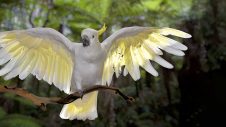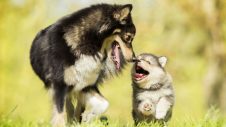It’s inevitable that after a natural disaster or bushfire, wildlife become displaced from their natural environments and are often injured or sick as a result.
What to do if you come across sick or injured wildlife
First and foremost, sick or injured wildlife are very likely to be distressed and may run, hide, or bite out of fear, pain, or their natural defence mechanisms. We recommend contacting your local wildlife organisation or Greencross Vets for advice. You should approach injured or sick wildlife with care and have some basic equipment like a towel, blanket, thick gloves, and some sort of sturdy carrier or firm cardboard box.
If you are able to handle sick or injured wildlife, we recommend that you do the following to ensure your safety and to prevent further injury or stress to the animal:

Assess the situation
Ensure that it is safe for you to approach the injured or sick animal.
Remain calm
Remain calm when approaching the animal—you do not want to startle or scare it.
Slowly approach the animal
If you can get close to the animal, gently place a towel, blanket, jumper, or pillowcase over its head. This will help keep it calm and aid with handling. If it is a bird, you will need to gently wrap it in a towel or hold the wings close to its body. Place it into a secure, well-ventilated cardboard box or sturdy carrier.
Transport the animal
It is best to transport the animal in a secure, well-ventilated cardboard box or sturdy carrier. Try to keep the environment quiet and dark to minimise stress. If the animal feels cold, try to keep them in a warm area while transporting them. Don’t try to offer food or water until you have advice from a wildlife carer or vet that it is safe to do so.
Take note of where you found the animal
It is vital that you provide your vet or a wildlife carer with the location of where you found the animal, as it will need to be released back into the same or similar environment once rehabilitated.
Take the injured or sick animal to your local Greencross Vets or Wildlife shelter
Your local Greencross Veterinary Clinic will assess the severity of the injuries and admit them to the clinic for ongoing support and treatment. There will be no cost to you for the treatment or surrender of wildlife. Once stabilised and the vet team are happy with their recovery, a wildlife carer will be contacted to continue their rehabilitation until they are strong enough to be re-released into their natural environment.

Important
Should you encounter a potentially dangerous animal (e.g. snake or bat), DO NOT APPROACH OR TOUCH THE ANIMAL. Contact a professional handler or wildlife carer to come and help. Wildlife carers who care for bats are vaccinated to ensure they can safely handle bats.
NSW
VIC
SA
South Australian Veterinary Emergency Management
QLD
Queensland Parks and Wildlife Service

 Greencross Vets
Greencross Vets 





